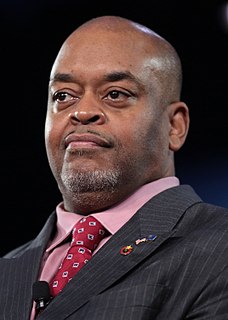A Quote by Kirk Douglas
I have been trying to create a campaign to have our country make an apology for slavery, for the way that blacks were treated before the Civil War and after the Civil War.
Related Quotes
Republicans have reached out so much to black Republicans because it's part of our tradition. Blacks have been in this nation longer than most other Americans with the possible exception of white Anglo-Saxon Protestant. The first blacks in Congress and the first black Governor were all Republicans. It was Republicans who fought the Civil War over slavery and who introduced the Civil Rights legislation over the next hundred years.
I didn't know enough about the Civil War or its lingering effects as we all should. It's really easy to think that the Civil War was the end of slavery, and the triumph of our collective conscience and humanity over oppression. Sadly, the oppression and systemic subjugation of people of color in this country still exists.
So about 80 years after the Constitution is ratified, the slaves are freed. Not so you'd really notice it of course; just kinda on paper. And that of course was at the end of the Civil War. Now there is another phrase I dearly love. That is a true oxymoron if I've ever heard one: "Civil War." Do you think anybody in this country could ever really have a civil war? "Say, pardon me?" (shoots gun) "I'm awfully sorry. Awfully sorry."
You take a look at the history of African Americans in the US. There's been about thirty years of relative freedom. There was a decade after the Civil War and before north/south compact essentially recriminalized black life. During the Second World War there was a need for free labor so there was a freeing up of the labor force. Blacks benefitted from it.
What happened in Ukraine? The coup d'état in Ukraine has led to a civil war, because, yes, let's say, many Ukrainians no longer trusted President Yanukovych. However, they should have legitimately come to the polls and voted for another head of state instead of staging a coup d'état. And after the coup d'état took place, someone supported it, someone was satisfied with it, while others were not. And those who did not like it were treated from the position of force. And that led to a civil war.



































